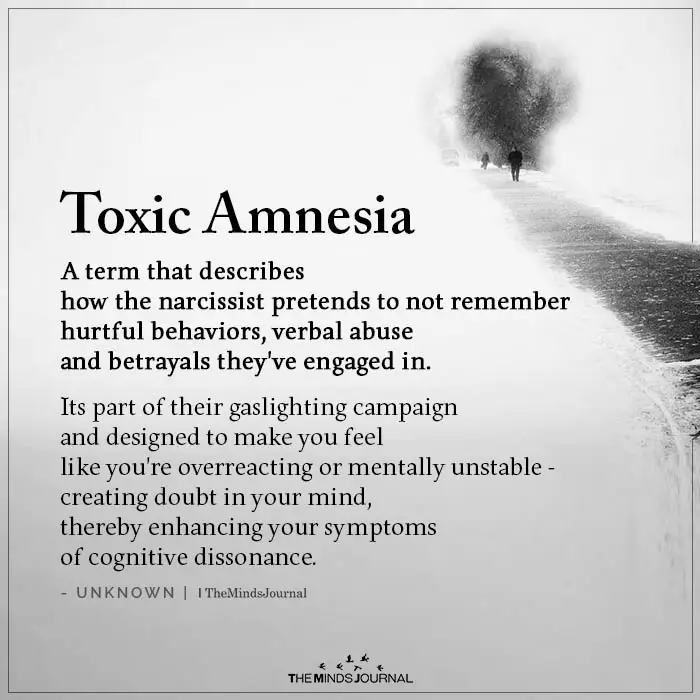Is it possible to have a normal marriage with a narcissist, let alone one without abuse and lies? When you are married to a narcissist, every day will be like meeting with a new person.
By Dr. Elinor Greenberg
What goes on behind closed doors is not nearly as appealing as things appear.
Many people with narcissistic personality disorder appear to be in a successful and happy marriage. Their social media posts show them laughing together over a special dinner, walking hand-in-hand along the beach, and even renewing their marriage vows in front of friends and family. Should we believe the pictures? Can a narcissist have a happy marriage?
Unfortunately, the answer is almost always “no.” The photos and the couple’s public behavior show one thing, while something much less appealing is going on behind the scenes. Once past the courtship stage, all the relationships where one person has a narcissistic personality disorder include some form of abuse and a great deal of tension.
As not all people with narcissistic personality disorder are alike, each couple will have their own form of misery. However, this misery follows a fairly predictable pattern.
Read: Who Is A Narcissist And What Makes One?
Narcissistic partners usually pick fights over trivial matters, verbally insult their spouses, and tend to be intrusive and controlling. They often say and do very hurtful things. In some of these happy-looking couples, the spouse of the narcissist is being physically abused and is hiding the bruises with clothing or makeup.

Even if nothing overtly terrible is going on, most narcissists feel free to ignore their spouse’s requests and “forget” to honor any promises they made that are no longer convenient for them—such as their marital vow to be faithful or their promise to come home early for dinner.
If the non-narcissistic partner tries to have a rational conversation about what feels unfair, the narcissist is likely to become furious. People with narcissistic personality disorder are generally unwilling to accept any responsibility for anything that they are doing that makes their spouse unhappy.
They may lie, twist the truth, rewrite history, or shift the blame and present themselves as the real victim. Whatever they want at the moment is usually more important to them than the actual truth or their mate’s happiness.
Note: I am using the terms narcissist and narcissistic as a shorthand way to describe people who qualify for a diagnosis of narcissistic personality disorder.
Why does the couple appear so happy?
The usual reason is that one or both of them are faking happiness. Higher functioning people with NPD are quite capable of bringing their mate to tears before the two leave for a party or dinner with another couple, and then spend the rest of the evening pretending all is well. Both members of the couple usually have their own reasons for keeping up appearances.
- The person with NPD needs to project an image of being perfect and having the perfect relationship.
- The non-narcissistic partner may be trying to avoid being publicly embarrassed, so he or she goes along with the pretense.
- Even worse, the non-narcissistic partner may be afraid to tell anyone the real truth about the relationship.
Many people in this situation feel unprepared to leave the relationship, even when it turns abusive. People stay for all sorts of reasons: lack of funds, fear of being on their own, dependency issues, religious beliefs, or not wanting to deprive the children of a parent.
Many spouses of narcissists hate confrontations and hope that things will improve if they just ignore the bad behavior. If the narcissistic mate is high functioning, there are likely to be some good times together, as well as bad times.
This creates a situation in which the abused partner does not want to rock the boat and complain when things are going well. When things are going badly and the narcissist becomes angry and devaluing, the non-narcissistic partner knows that complaining will just make things worse.
The Spouse’s Dilemma
If non-narcissistic spouses want the relationship to continue, they learn to ignore a lot of their mate’s bad behavior. Over time this avoidant pattern allows the narcissistic spouse to take more and more control over every aspect of their life. Trying to tell friends and family the truth about the relationship can be very embarrassing.
It is hard to explain to people who have never lived with a narcissist how abusive and controlling this seemingly nice person can be. And, if you do explain, other people will not understand why you do not just leave.
There are three basic versions of the spouse’s dilemma. They differ due to the characteristics of the narcissistic subtype of the mate.
1. Exhibitionist Narcissist:
When their mate does not cater to their whims and their demands, they become angry and devaluing. Exhibitionist narcissists rarely honor any promises they made to their mate unless what they promised dovetails with what they currently want.
If it does not, they may “forget” the promise, or claim they never said “that,” or did not mean it the way it was taken. Some, not all, are so estranged from caring about the truth that they lie freely. Others simply twist the truth until it suits their needs.
Read: 3 Mind Games All Narcissistic Men Play In Relationships
Example—Exhibitionist Sam and Fran
Fran came from a loving, close family. When Sam married Fran, he agreed that he was happy to have dinner with her parents and siblings once per month. After they were married, he found that he did not like these dinners because he was not the center of admiring attention. Other people at the table sometimes brought up topics that bored him.
Sam started finding reasons to miss these dinners. When Fran caught on and reminded him of his promise, he got quite nasty and said:
You are too attached to your family. It is unhealthy! Besides, they always ignore me. If I had known what they were really like, I would never have made that promise. It is null and void right now. If you want to see them go visit without me but don’t expect me to sit home waiting for you.
2. Closet Narcissist:
Closet narcissists are usually less overtly confrontative with their mates because they are more obviously insecure than exhibitionist narcissists. They sometimes perceive themselves as helpless victims whose bad behavior is justified because their mate did them wrong. They will exaggerate, take things out of context to make their point, or outright lie to evade consequences.
Translation of Justified: Their mate is not doing what they expected.
Read: 5 Types of Narcissistic Blame Shifting
Example—Intrusive Needy Sarah and Charles
Sarah has the closet narcissistic subtype of NPD. She appears warm, friendly, and nice. However, she feels entitled to get her way and is as self-centered and lacking in emotional empathy as any other type of narcissist. Sarah can be extremely demanding and intrusive when she is not getting whatever she wants or thinks she needs.
When Sarah gets anxious or bored, she phones her husband Charles at work and demands to speak with him—despite knowing that he has important meetings all day and she has been repeatedly asked not to call him at work unless it is an emergency.
If Charles does not come to the phone or immediately return her call, Sarah becomes frantic and keeps calling him every ten minutes. If he still does not pick up, she may actually show up at his workplace. She justifies this by telling herself that she was worried his not picking up was due to some highly unlikely emergency.
She also gets furious with him when he enforces boundaries. She feels entitled to all of his attention. She may use his not responding to take her intrusiveness even further and call one of his work colleagues or his friends to check on him, to punish him, and as a workaround to get past his boundaries.
Sarah is thoughtless about other people’s feelings when she feels triggered. Rather than directly confronting her husband, she will try to manipulate him or make him feel guilty to get what she wants. Charles has learned to dread seeing Sarah’s name pop up on his phone because he knows she just wants his attention and will find a passive-aggressive way to punish him if he does not pick up.
3. Malignant Narcissist:
In my experience, they are all abusive, sadistic, and controlling. They lie whenever it suits them. Most sane mates with a modicum of self-esteem, and the ability to earn a living, leave these marriages eventually. If they do not, they are likely to become a broken, insecure, mess. It is hard to even pretend to be happy when you are in a relationship with a malignant narcissist.
Read: Who Is a Malignant Narcissist? Who Are The People They Target

Example—Sadistic Jerry and Broken Janet
Janet married Jerry because she admired his intelligence and what she took to be his strength. Unfortunately, she had misjudged the situation. Jerry was actually a controlling malignant narcissist. What appeared to be strong was his unwillingness to adjust to other people’s reasonable demands.
He never forgot a slight and liked to take vengeance on anyone who dared thwart him. What Janet initially saw as protectiveness, was actually an expression of Jerry’s desire to control every aspect of her life—what she wore, who her friends were, and how often she could see her parents and siblings.
Janet entered the relationship as a fairly high-functioning and independent person. She had a decent job, a good relationship with her family, and no history of mental illness. After a decade married to Jerry, she was a broken mess who cried all the time.
Punchline:
I do not believe that it is possible for narcissists to have what most people would call a normal or happy marriage. The relationships that do manage to survive do so mainly because the non-narcissistic mate has high self-esteem, resources that the narcissist values, a good reason for staying, the ability to maintain boundaries, and is very adaptable and easy-going.
What do you think? Can a person with Narcissistic Personality Disorder be happily married? Leave a comment below.
Written By: Elinor Greenberg, Ph.D. Originally Appeared In: Psychology Today
Can you stay in a marriage with a narcissist?
You may hold the fantasy of you both staying happy together in a narcissistic marriage, but unfortunately, a narcissist’s inability to love and value their relationship will make it nearly impossible to be actually happy in a relationship with one.
What to expect when you are married to a narcissist?
Narcissists are usually very charming individuals. But after you’re deep in the relationship, you may experience a lack of empathy, different forms of manipulation, and emotional abuse.
What is a narcissist husband like?
With your narcissistic husband, your life will be all about making him happy. Your narcissist husband will thrive on the idea that you’re his trophy. He will show you no compassion and for that, he will blame ‘you’. That gives him a sense of power over you.
What are the most common narcissistic marriage problems?
Being in a marriage with a narcissist can be emotionally draining and negatively affect your sanity. The most common narcissistic marriage problems are:
– Their need to control
– Gaslighting
– Emotional abuse
– Manipulation
– Extreme Jealousy










